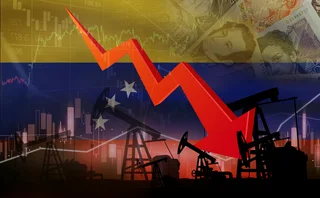Data house of the year: GlobalView
Vendor ramps up offerings in enterprise data management

Energy Risk Awards 2016
GlobalView is eager to prove that it is not the company it used to be. Founded in 1996, the Chicago-based software vendor had focused traditionally on scraping commodity market data from sources such as exchanges, brokerages and price-reporting agencies and delivering them to traders and analysts through a desktop-based interface. Lately, though, it has pushed into the enterprise data management space, providing tools that allow the seamless sharing of data between the front, middle and back office and competing more directly against vendors such as Vancouver-based ZE and London-based DataGenic.
"We are essentially a brand new company as it relates to our product offerings and underlying architecture," says Chris Harrison, the company's chief product officer. "We have done a ground-up rebuild over the last five years and have made significant investment in both new product development as well as our data centre infrastructure."
The capstone in GlobalView's efforts to provide a comprehensive data management solution is its new Curve Builder tool, developed last year as part of its MarketView solutions suite and set to launch officially in the near future. Fully integrated with GlobalView's desktop environment, the tool allows users to generate forward curves and push them to others within the same organisation – tasks a user might have done historically on an Excel spreadsheet, but with the benefit of straight-through processing.
Harrison says Curve Builder is just the latest in a series of GlobalView products catering to clients' data management needs, but he hopes it solidifies his firm's status as a player in the space. "We've always had very good data management tools but, unfortunately, we've had sort of a reputation as an organisation that only builds aesthetically pleasing front-office products," he says. "A lot of times, we weren't even part of the data management discussion, when the reality is that we've had these solutions available for quite some time."
Clients say GlobalView's data management tools have brought efficiency gains and tighter integration between disparate company functions. For example, one multinational oil and gas firm that has been a client for nearly two years uses the vendor to host proprietary data within the company's servers, in addition to using its Excel integration and forward curve products. Working with GlobalView specialists, it is using the platform to create a single source of price information across the company.
"For us, the lower footprint, the functionality and the data have all been big benefits," says the oil and gas firm's Houston-based head of risk control. "We work directly with the developers, and they're pretty quick to turn around the things we request in a timely manner. We can definitely see that it's a total solution, and it has everything it needs to do all that we're looking for."
Part of GlobalView's appeal is that its architecture uses the software-as-a-service (Saas) model, in which software is hosted on a central server and accessed through a lightweight interface on individual users' desktops. That simplifies deployments and upgrades and allows cost savings – an attractive feature at a time when many energy companies are facing cutbacks in their IT budgets.
Despite such headwinds, GlobalView has posted impressive sales growth. In 2015, the vendor picked up at least half-a-dozen new accounts at companies in North America, Europe and Asia. One of its major successes was a large power company that adopted GlobalView as a unified solution across its front, middle and back office.
Electricity is a current area of focus for GlobalView, which has historically been stronger in oil and products than in power. The vendor has long collected data from North American independent system operators, but it began to put more emphasis on managing the data and bringing it to the surface of its platform two years ago, Harrison says. The firm is now in the process of rolling out a new suite of power analytics tools tailored to traders and risk managers in the electricity markets. "That is a major push for us," he says.
Underscoring its growth ambitions, GlobalView recently opened an office in Sao Paolo, in addition to its existing offices in Houston, Chicago, Calgary, London and Singapore. "We see some opportunities there both in the energy and the agriculture markets, with the latter being new territory for us," he says.
Agriculture is GlobalView's latest frontier. Besides offering data from exchanges and government sources such as the US Department of Agriculture, on March 2 the firm announced a first-of-its-kind partnership with Cannabis Benchmarks, a Connecticut-based publisher of price data on the legal cannabis market.
More on Risk management
Interest in battery and flexibility soars in European energy markets
Energy traders are structuring bespoke contracts around Bess and flexibility that facilitate new ways of managing and sharing risk in this nascent market
Interview: Abaxx’s Joe Raia on LNG, Corsia and wind contracts
Abaxx’s Joe Raia talks to Energy Risk at E-World 2026 about the performance of its LNG and Corsia contracts and its latest wind contracts
Axpo interview: the rise of flexibility contracts in European power
Axpo’s Domenico Franceschino talks to Energy Risk about flexibility contracts, battery optimisation and the role of risk management in valuing these bespoke products
Energy firms revisit CTRM systems as tech advances
Energy executives mull how to tap into the explosion of new technologies entering the risk space, but systems selection must consider future business needs, writes Yefreed Ditta at Value Creed
CRO interview: Brett Humphreys
Brett Humphreys is head of risk management at environmental markets specialist Karbone. He talks to Energy Risk about the challenges of modelling outcomes in unpredictable times and how he’s approaching the risks at the top of his risk register
How geopolitical risk turned into a systemic stress test
Conflict over resources is reshaping markets in a way that goes beyond occasional risk premia
Energy Risk Debates: the influence of risk culture
The panellists examine different risk cultures and discuss the risk manager’s role and influence in creating a risk culture
Energy Risk reaction: Venezuela and oil sanctions
Energy Risk talks to Rob McLeod at Hartree Partners about the energy risk implications of the US’s control of Venezuelan oil







